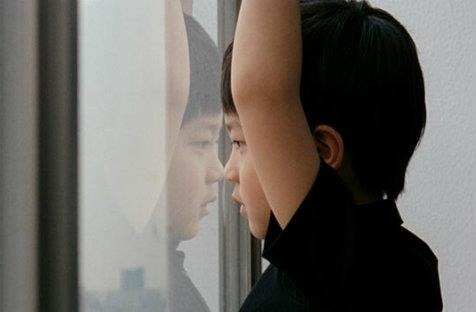When the inhabitants of Hirokazu Kore-eda’s films face life-defining moments, they do so with quiet determination. For two decades, the Japanese writer/director has chronicled calmness in the face of challenge, his back catalogue – After Life, Nobody Knows, Still Walking, and I Wish among them – evidence of his interest in coping mechanisms. For the filmmaker, it is the space that exists around emotions that proves telling, the things left unsaid that offer an indication of character. His protagonists encounter separation and struggle, but react with delicacy and dignity as they reshape their outlook.
It is far from coincidental, then, that Kore-eda furnishes his features with the plights of the next generation, the expressive faces of children colouring his cinematic tapestry. As parents are ensconced in the troubles of life, their offspring mirror their intentions but not their actions, their experiences shaped by the wonder of youthful optimism. The helmer’s success with child performers has rightfully garnered universal admiration; however it is the thoughtfulness of his material that aids their efforts. Able to deliver the hope so often lacking in adults, Kore-eda directs his young charges to convey humanity at its most honest and unguarded.
The auteur’s latest feature, the 2013 Cannes Film Festival jury prize-winning Like Father, Like Son (Soshite chichi ni naru), doesn’t challenge his modus operandi; instead, it offers reinforcement of the sensitive and bittersweet kind. The prevailing poignant mood remains, as does the focus on family, with six-year-olds Keita (Keita Ninomiya, The King and I) and Ryusei (debutant Hwang Sho-gen) taking centre stage. For the former’s well-off workaholic father Ryota (Masahuru Fukuyama, Japanese TV’s Garireo) and devoted mother Midori (Machiko Ono, Outrage Beyond), as well as the latter’s suburban shopkeeper parents Yudai (Franky Lily, Yellow Elephant) and Yukari (Yôko Maki, Before the Vigil), a revelation disrupts their domestic bliss. Faced with the knowledge that their sons are not their own, both families attempt to navigate a way forward.
In addition to adhering to his own thematically-similar canon, there’s no shortage of the familiar in Kore-eda’s tale, its baby swap storyline seen in everything from soap operas to serious dramas, its clash of classes sighted in all manner of the same, and its heightening of paternal ties common film fodder. Thankfully, in retaining his patience and precision, the filmmaker avoids the obvious in the warm, wise and witty study of families forced to choose between the bonds of blood and the sentiments spanning from six years of nurture.
Instead, in both narrative and aesthetic he concentrates on the minutiae of the journey from shock to acceptance with contemplation and a cautious sense of lightness. In highlighting the adjustment process of the pairs of titular fathers and sons, the film seethes with empathy, eschewing contrivance and cliché for earned catharsis. As the most rigid of characters, Ryota gradually becomes the feature’s focal point as he rallies, in his own restrained way, against the change the scenario offers. It is in his evolving interactions – and the eventual understanding of the meaning of fatherhood – that Like Father, Like Son is at its most heartrending.
Nuanced performances aid in the telling, as does the director’s attentive gaze and visual accuracy, with the smaller elements of each layering to build a meticulous and moving whole. That the film still surprises even as its story comes to its natural conclusion speaks of its ease and earnestness; that the feature earns affection in its avoidance of easy options is characteristic of Kore-eda’s care and consideration.
Rating: 4 stars out of 5
Like Father, Like Son (Soshite chichi ni naru)
Director: Hirokazu Kore-eda
Japan, 2013, 120 mins
Melbourne International Film Festival
July 25 – August 12
Actors:
Director:
Format:
Country:
Release:





